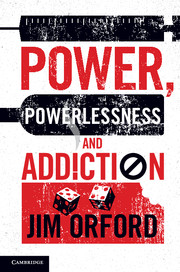Book contents
- Frontmatter
- Dedication
- Contents
- Preface
- Acknowledgements
- 1 Powerful connections
- 2 How addiction erodes free agency
- 3 Addiction subordinates the interests of family members and friends
- 4 Inequality in the power to resist addiction
- 5 Power and powerlessness in the addiction supply industries
- 6 Reasserting control and power in the process of change and treatment
- 7 Facing up to the power of addiction and those who benefit from it
- References
- Index
- Frontmatter
- Dedication
- Contents
- Preface
- Acknowledgements
- 1 Powerful connections
- 2 How addiction erodes free agency
- 3 Addiction subordinates the interests of family members and friends
- 4 Inequality in the power to resist addiction
- 5 Power and powerlessness in the addiction supply industries
- 6 Reasserting control and power in the process of change and treatment
- 7 Facing up to the power of addiction and those who benefit from it
- References
- Index
Summary
This book is exploratory. There is no single body of knowledge corresponding to power, powerlessness and addiction; I have had to make it up as I went along. The idea for this book merges two streams of thought which have dominated my career in psychology. One of those is addiction studies where power is scarcely ever explicitly referred to. The other is community psychology, for which power and powerlessness are central concepts. Writing this book has, therefore, served a personal purpose in uniting the two halves of my professional life which might otherwise remain disconnected. I might go further and argue that in order to explore the relationship between power and addiction it is necessary to bring together theory and research arising from different scientific traditions: on the one hand the biomedical, public health and epidemiological and on the other the social sciences. The former have dominated addiction studies while the latter have played a much lesser role. One feature of my earlier book on addiction, Excessive Appetites (Orford 2001), which left me dissatisfied was its emphasis on the individual and its relative lack of attention to the social. The present book is a partial attempt to put that right.
Although power is rarely mentioned when addiction is discussed, it had long occurred to me that power and powerlessness were never far below the surface and, once you were looking for them, they often appeared. The very concept of dependence, often used as a synonym for addiction, implies a loss of power. Indeed, acknowledging one's powerlessness is considered by Alcoholics Anonymous and other 12-step groups to be a requirement for recovery. The experience of family members and others closely affected by other people's addictions – something that my colleagues and I have made a special study of – can well be thought of as an experience of powerlessness. Once the focus moves beyond the individual and the family to consider the complex network of connections involved in the supply, legal or illicit, of substances and activities to which people become addicted, then the exercise of power and the creation and exploitation of the powerless are impossible to avoid. All those manifestations of power, overt or hidden, malignant or benign, and others, are discussed in the chapters which follow.
- Type
- Chapter
- Information
- Power, Powerlessness and Addiction , pp. ix - xivPublisher: Cambridge University PressPrint publication year: 2013



